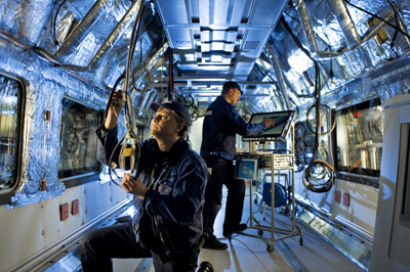EUROSTAR is blaming a travel dip during the run-up to the Olympics and the weak Euro for a 5 per cent fall in sales revenue during the third quarter of 2012, but the company said bookings have 'bounced back' since the Games and that it intends to capitalise on the 'post-Olympic glow'.
The company is also reporting that a £700 million investment in new, faster trains and a refurbishment of the existing fleet is on schedule for completion in 2015.
Eurostar said its trading results, released this morning, amounted to a 'solid performance'. Total passengers for the year so far are 7.4 million, compared with 7.3 million during the same period in 2011.
Passenger numbers were up 4 per cent during the Olympics, compared with 2011, but the number of leisure travellers coming from the continent to London in July was lower than last year. The business market was also hit, because companies advised their employees to steer clear of the capital in the last few weeks before the Games began. These factors, combined with the weakening Euro, meant that quarterly revenue was £188 million compared with £197 million in 2011.
Total sales revenue for the year so far is £612 million compared with £619 million in the same period in 2011, but chief executive Nicolas Petrovic is shrugging off the gap. He said: “We have had an inspiring and rewarding summer bringing athletes and spectators from around the world to the Olympic Games. Whilst many corporate clients and business customers decided to steer clear of London during the Games, we nonetheless delivered a solid performance.
"Looking ahead to the end of the year, the outlook is strong. Bookings have bounced back and we are now seeing a return to more typical travel patterns. With the tremendous boost that London has experienced over the summer we are looking forward to capitalising on the city’s post-Olympic glow."
Refurbishment of the fleet has started, and the first pictures have been released of the next-generation e320 trains which are being built by Siemens at Krefeld in Germany. The ten new trains will be faster, with a maximum speed of 320km/h. They will also be technically compatible with more of the continental network, and are expected to be used on new Eurostar routes from 2014. The company is facing competition through the Channel Tunnel from Deutsche Bahn within the next three or four years and has not yet revealed its new destinations, but the favourite is probably Amsterdam.
Nicolas Petrovic said: "The redesign and upgrading of our fleet marks the next phase of our business. With customers increasingly opting for rail over plane for short-haul journeys across Europe, we want to provide an unrivalled travel experience and to encourage more passengers to choose High Speed rail."


